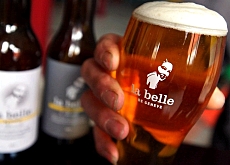Microbrewers fizz amid falling beer sales

Tougher drink-driving laws may be putting the skids under beer sales in Switzerland but one sector of the industry is positively flourishing: microbreweries.
The country is now home to around 100 of these small-scale beer producers who are leading a revival in speciality brewing in a predominantly lager-drinking nation.
Last year speciality beers produced by big and small breweries accounted for 5.5 per cent of the 3.6 million hectolitres of beer consumed in Switzerland, and their market share is growing.
Proof of this brewing revival was on display at a recent festival in Solothurn where around 200 beers from 20 smaller Swiss breweries were available for sampling.
Products ranged from wheat beers and stouts to dark lagers and seasonal ales, all bursting with flavour and some packing a hefty alcoholic punch.
Manning one stand was microbrewer Jérôme Rebetez, who had brought along several thoroughbreds from his Franches-Montagnes Brewery in the western village of Saignelégier.
His output includes a wheat beer called La Salamandre, a dark beer called La Torpille, and a mulled beer called La Dragonne, which should be served at 60 degrees Celsius.
But it was his perky La Mandragore winter beer that caught the judges’ eyes and taste buds, winning a gold medal at the festival.
“Ten years ago no one wanted to drink beer from the Franches-Montagnes but now they do because it’s something special, very tasty and it’s a beer that you can’t find anywhere else on the market,” he told swissinfo.
Brewing revival
Rebetez started out eight years ago after winning a television prize to set up his own business. He now produces 100,000 bottles of award-winning beer, which is “two hours’ production for a big brewery, but a year’s work for me”.
Switzerland’s microbrewers are indeed a busy breed. Today they are responsible for half the different beers on sale in Switzerland, even though their overall market share is a pint-sized one per cent.
Rebetez says making ends meet remains a constant battle, but claims the situation is improving as the speciality-beer market increases.
“There is a growing movement away from lager towards new types of beer,” he added.
The rise of microbreweries in Switzerland comes amid a long-term decline in beer sales. According to the Swiss Brewery Association, which represents the big players such as Heineken and Feldschlössen (Carlsberg), sales were down almost seven per cent during the first three months of the year.
The association blames a lowering of the drink-drive limit which came into force on January 1, but consumption of beer has been decreasing steadily for the past 15 years.
Whereas the Swiss sunk 71 litres per head in 1990, last year they only managed 57 litres – putting Switzerland at the bottom of the European beer-drinking league.
Speciality beers
But the downward spiral has failed to daunt the dozens of microbrewers who have been setting up around the country and pumping out an ever-increasing range of beers.
Alex Künzle, who runs the Öufi Brewery near Solothurn, is another of the new generation of microbrewers tapping into this growing demand for speciality beers.
A former sales manager with a mineral water company, Künzle set up shop five years ago and now brews 1,600 hectolitres on site, with a further 1,000 hectolitres brewed to order elsewhere.
He produces around half a dozen varieties, including a golden and a dark lager, stout and wheat beer as well as seasonal brews, which are all sold in and around Solothurn.
“What we are trying to do is bring the people closer to beer,” he said. “I think more and more Swiss have had enough of the same old lager and want to try something else.”
The hardest challenge Künzle faced when starting out – and it’s a similar story among other microbrewers – was raising the money. The second was learning to brew.
“The third challenge is selling the beer, because you have all these big breweries against you. 99 per cent of the restaurants have a contract with a big brewery,” he said.
Contract dispute
These exclusive contracts between the big brewers and restaurant owners are a familiar gripe among microbrewers.
Following an investigation into the practice, the competition commission ruled last December that unlimited contracts were unfair and in future they should not exceed five years.
Patrick Schaefli, vice-director of the Swiss Brewery Association, denies that the bigger breweries are trying to make life difficult for the microbreweries.
He says they – along with their bigger rivals – are leading a revival of traditional, regional beers, which has proved a boon to an industry struggling with declining sales.
“They are contributing quite a lot to the beer culture in this country and it is encouraging other breweries to make more specialities, more regional beers. They are having a good influence – we are not against microbreweries,” he said.
swissinfo, Adam Beaumont in Solothurn
Swiss brewers produce around 3.6 million hectolitres a year.
Feldschlössen, which is owned by Carlsberg, makes more than 2 million hectolitres.
Heineken brews more than 800,000 hectolitres.
Microbrewers account for just 1% of the market.
Switzerland has a rich brewing pedigree. A plan of St Gallen monastery dating back to the ninth century shows three brewhouses.
During the early 1900s there were more than 250 breweries across Switzerland, but consolidation within the industry saw this figure shrink to around 25 by the early 1990s.
But this figure has since risen to around 140, buoyed by the presence of around 100 microbrewers.

In compliance with the JTI standards
More: SWI swissinfo.ch certified by the Journalism Trust Initiative









You can find an overview of ongoing debates with our journalists here . Please join us!
If you want to start a conversation about a topic raised in this article or want to report factual errors, email us at english@swissinfo.ch.